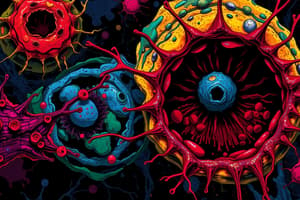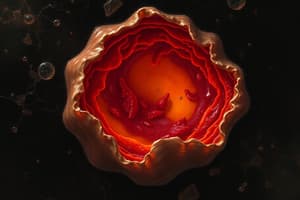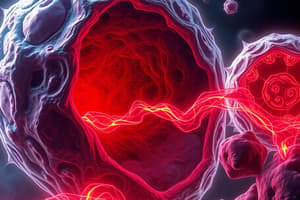Podcast
Questions and Answers
What characteristic of mitotic figures distinguishes normal cells from tumor cells?
What characteristic of mitotic figures distinguishes normal cells from tumor cells?
- Normal cells have irregularities in their mitosis.
- Normal cells display multipolar mitoses.
- Tumor cells exhibit controlled cell division.
- Tumor cells have abnormal mitotic figures. (correct)
Which statement correctly describes the role of mitochondria in tumor cells?
Which statement correctly describes the role of mitochondria in tumor cells?
- They have a typical structure like normal cells.
- They exhibit reduced numbers compared to normal cells.
- They rely more on glycolysis for energy production. (correct)
- They primarily use oxidative phosphorylation for energy.
What is a known effect of genetic mutations in proto-oncogenes?
What is a known effect of genetic mutations in proto-oncogenes?
- They enable normal cellular function.
- They promote excessive cell growth and proliferation. (correct)
- They restrict cell growth and division.
- They convert them into tumor suppressor genes.
How does the Golgi apparatus function in tumor cells?
How does the Golgi apparatus function in tumor cells?
Which of the following are examples of tumor suppressor genes?
Which of the following are examples of tumor suppressor genes?
What change occurs in the mitochondria of tumor cells compared to normal cells?
What change occurs in the mitochondria of tumor cells compared to normal cells?
What is the primary difference in the protein secretion function of the Golgi apparatus in tumor cells?
What is the primary difference in the protein secretion function of the Golgi apparatus in tumor cells?
What effect does the mutation of proto-oncogenes have on cellular behavior?
What effect does the mutation of proto-oncogenes have on cellular behavior?
What is the primary mechanism of NETosis?
What is the primary mechanism of NETosis?
Which type of cell death is characterized by inflammation and cell rupture?
Which type of cell death is characterized by inflammation and cell rupture?
What distinguishes NETosis from other forms of cell death?
What distinguishes NETosis from other forms of cell death?
Which of the following is NOT a trigger for necrosis?
Which of the following is NOT a trigger for necrosis?
How does pyroptosis differ from apoptosis?
How does pyroptosis differ from apoptosis?
Which type of cell death is associated with a controlled process?
Which type of cell death is associated with a controlled process?
What can excessive NETosis lead to?
What can excessive NETosis lead to?
What is a common result of both necroptosis and necrosis?
What is a common result of both necroptosis and necrosis?
What is the primary function of the p53 tumor suppressor gene?
What is the primary function of the p53 tumor suppressor gene?
How does the overexpression of BCL-2 affect cancer cells?
How does the overexpression of BCL-2 affect cancer cells?
Which of the following statements about kinases is true?
Which of the following statements about kinases is true?
What role do receptor tyrosine kinases (RTKs) play in cancer?
What role do receptor tyrosine kinases (RTKs) play in cancer?
Which of the following pathways is frequently hyperactivated in cancer?
Which of the following pathways is frequently hyperactivated in cancer?
What is an oncogene?
What is an oncogene?
What impacts do EGFR and ALK mutations have on cancer cells?
What impacts do EGFR and ALK mutations have on cancer cells?
Which feature characterizes the dysregulation of kinase signaling pathways in cancer?
Which feature characterizes the dysregulation of kinase signaling pathways in cancer?
What is the primary goal of combining tyrosine kinase inhibitors with other treatments?
What is the primary goal of combining tyrosine kinase inhibitors with other treatments?
How can cancer cells develop resistance to combination therapies?
How can cancer cells develop resistance to combination therapies?
What does personalized medicine utilize to tailor cancer treatments?
What does personalized medicine utilize to tailor cancer treatments?
What is one consequence of genetic instability in cancer cells?
What is one consequence of genetic instability in cancer cells?
Which mutation can prevent EGFR inhibitors from binding effectively to cancer cells?
Which mutation can prevent EGFR inhibitors from binding effectively to cancer cells?
What strategy might cancer cells use to bypass inhibited pathways?
What strategy might cancer cells use to bypass inhibited pathways?
Which of the following best describes the mechanism of action for combination therapies?
Which of the following best describes the mechanism of action for combination therapies?
What is a potential limitation of personalized medicine in cancer treatment?
What is a potential limitation of personalized medicine in cancer treatment?
What is the primary cause of gastroesophageal reflux disease (GERD)?
What is the primary cause of gastroesophageal reflux disease (GERD)?
Which condition is considered a significant risk factor for esophageal adenocarcinoma?
Which condition is considered a significant risk factor for esophageal adenocarcinoma?
What type of metaplasia is associated with chronic smoking in the respiratory tract?
What type of metaplasia is associated with chronic smoking in the respiratory tract?
What is the primary cause of cervical dysplasia?
What is the primary cause of cervical dysplasia?
Which clinical relevance is associated with cervical dysplasia?
Which clinical relevance is associated with cervical dysplasia?
What type of cancer risk is increased due to smoking-induced metaplasia in the lung?
What type of cancer risk is increased due to smoking-induced metaplasia in the lung?
What is a common detection method for cervical dysplasia?
What is a common detection method for cervical dysplasia?
What is the significance of early detection and treatment in cervical dysplasia?
What is the significance of early detection and treatment in cervical dysplasia?
Flashcards are hidden until you start studying
Study Notes
NETosis
- Involves neutrophils releasing DNA fibers loaded with antimicrobial proteins, forming neutrophil extracellular traps (NETs)
- Traps and kills pathogens
- Excessive NETosis can contribute to inflammatory and autoimmune diseases
Cell Death Mechanisms
- Necrosis is uncontrolled cell death, involves inflammation
- Apoptosis is programmed cell death, is controlled and non-inflammatory
- Necroptosis is programmed cell death, similar to apoptosis but involves cell rupture and inflammation
- Pyroptosis is inflammatory programmed cell death, involves cell lysis
- NETosis is specific to neutrophils, involves the release of DNA traps
Causes of Cell Death
- Infection: Pathogens can directly damage cells or trigger an excessive immune response
- Physical Injury: Trauma disrupts the cell membrane leading to death
- Toxins: Harmful chemicals damage cellular components, causing necrosis
- Ischemia: Lack of blood supply deprives cells of oxygen and nutrients, causing necrosis
Cytology: Normal vs. Tumour Cells
- Mitotic Figures: Normal cells have controlled cell division, tumour cells exhibit abnormal mitotic figures indicating uncontrolled division
- Mitochondria: Normal cells have typical mitochondria, tumour cells have altered mitochondria with increased numbers, relying more on glycolysis for energy
- Golgi Apparatus: Golgi apparatus functions normally in protein modification and secretion in normal cells, while it is fragmented with increased secretion of proteins in tumour cells
Cellular Basis of Neoplastic Transformation
- Genetic Mutations: Mutations in proto-oncogenes convert them into oncogenes, promoting excessive cell growth and proliferation; mutations in tumour suppressor genes removes the inhibitory controls on cell growth
- Oncogenes: RAS and MYC are examples
- Tumour Suppressor Genes: TP53 and RB1 are examples
Cellular Basis of Transformation: Specific Examples
- Barrett's Esophagus: Chronic acid reflux can cause Barrett’s esophagus, a predisposition for developing esophageal adenocarcinoma
- Smoking-Induced Metaplasia: Chronic exposure to cigarette smoke causes the normal columnar epithelium of the bronchi to transform into squamous epithelium, increasing the risk of squamous cell carcinoma of the lung
Dysplasia
- Cervical Dysplasia: Abnormal growth and development of cells on the surface of the cervix, often detected through a Pap smear; caused by HPV infection, can range from mild to severe
- p53: A tumor suppressor gene that plays a key role in inducing apoptosis in response to DNA damage, mutations are common in cancers.
- Anti-apoptotic Proteins: Overexpression of proteins like BCL-2 can prevent apoptosis, contributing to the survival and accumulation of cancer cells.
Kinase Signaling Pathways in Cancer
- Kinases are enzymes that transfer phosphate groups to other proteins, activating signaling pathways that control cell growth and survival
- Receptor Tyrosine Kinases (RTKs): Often mutated or overexpressed in cancers, leading to constant activation of growth signals
- RAS-RAF-MEK-ERK and PI3K-AKT Pathways: Frequently hyperactivated in cancer, promoting uncontrolled cell proliferation and survival.
Oncogene Activation in Cancer
- EGFR and ALK Mutations: Lead to constant activation of signaling pathways that promote cell growth and survival in cancers like non-small cell lung cancer (NSCLC)
- EGFR is a receptor tyrosine kinase
Cancer Therapies
- Combination Therapies: Combining tyrosine kinase inhibitors (TKIs) with immunotherapy or chemotherapy enhances treatment efficacy by targeting multiple pathways simultaneously
- Personalized Medicine: Uses genomic profiling to tailor treatments to the specific genetic mutations present in a patient’s tumor
- Resistance Mechanisms: Cancer cells can adapt to therapies including changes in the tumour microenvironment, such as hypoxia and immune evasion, and can develop resistance through new mutations
How Cancer Cells Evade Targeted Treatments
- Genetic Mutations: Cancer cells can acquire new mutations that alter the target of the therapy
- Activation of Bypass Pathways: Cancer cells can activate alternative signaling pathways to continue proliferating
- Targeting the Tumor Microenvironment: Aiming therapies to influence the tumor microenvironment might be an approach to overcome resistance.
Studying That Suits You
Use AI to generate personalized quizzes and flashcards to suit your learning preferences.




